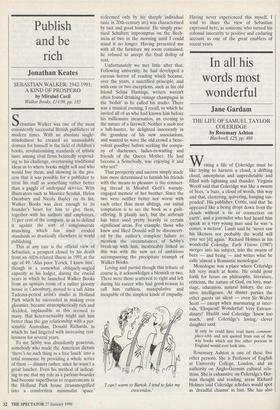Publish and be rich
Jonathan Keates
SEBASTIAN WALKER: 1942-1991: A KIND OF PROSPERO by Mirabel Cecil Walker Books, £14.99, pp. 185 Sebastian Walker was one of the most consistently successful British publishers of modern times. With an absolute single- mindedness he created an unassailable domain for himself in the field of children's books, revolutionising standards of artistic taste among rival firms belatedly respond- ing to his challenge, overturning traditional ideas as to where books might sell and who would buy them, and showing in the pro- cess that it was possible for a publisher to treat his staff as something rather better than a gaggle of underpaid skivvies. With illustrators such as Maurice Sendak, Helen Oxenbury and Nicola Bayley on its list, Walker Books was dear enough to its founder's heart for him to give them, together with his authors and employees, 51 per cent of the company, so as to defend it against the sort of conglomerate munching which has since eroded standards so drastically elsewhere in world publishing.
This at any rate is the official view of Sebastian, a prospect closed by his death from an AIDS-related illness in 1991 at the age of 49. 'Alas poor Yorick, I knew him', though in a somewhat obliquely-angled capacity as his lodger, during the crucial years in which he launched Walker Books from an upstairs room of a rather gloomy house in Canonbury, moved to a tall Alma Tadema-period artist's studio in Holland Park which he succeeded in making even gloomier, became stratospherically rich and decided, implausible as this seemed to many, that heterosexuality might suit him better than the gay relationship with a per- sonable Australian, Donald Richards, in which he had lingered with increasing rest- lessness for several years.
To me Sebby was abundantly generous, somebody who made the American dictum `there's no such thing as a free lunch' into a total nonsense by providing a whole series of them — dinners rather, since he wasn't a great luncher. Even his method of indicat- ing to me that my role as a parlour-boarder had become superfluous to requirements in the Holland Park house (transmogrified into a comfortless minimalist 'space' redeemed only by his sharply individual taste in 20th-century art) was characterised by tact and good humour. He simply prac- tised Schubert impromptus on the Bech- stein at two in the morning until I could stand it no longer. Having presented me with all the furniture my room contained, he refused to accept the final dollop of rent.
Unfortunately we met little after that. Following university, he had developed a curious horror of reading which became, over the years, a sanctified principle, and with one or two exceptions, such as his old friend Selina Hastings, writers weren't often found drinking vintage champagne in the 'bedsit' as he called his studio. There was a musical evening, I recall, to which he invited all of us who had known him before his millionaire incarnation, an evening in the nature of a farewell. Neither a snob nor a tuft-hunter, he delighted innocently in the grandeur of his new associations, and wanted to wave the old crowd a bene- volent goodbye before seeking the compa- ny of duchesses, ladies-in-waiting and friends of the Queen Mother. He had become a Somebody, was enjoying it and why not?
That prosperity and success simply made him more determined to furnish his friends with the means to pleasure is the connect- ing thread in Mirabel Cecil's warmly- engaged memoir of her brother. Since the two were neither better nor worse with each other than most siblings, our initial temptation is to see the book as a guilt- offering. It plainly isn't, but the airbrush has been used pretty heavily in certain significant areas. For example, those who knew and liked Donald will be disconcert- ed by the author's complete failure to mention the circumstances of Sebby's break-up with him, inextricably linked as this was with the new set of ambitions accompanying the precipitate triumph of Walker Books.
Loving and partial though this tribute of course is, it acknowledges a blemish or two. There were those scattered to right and left during his career who had good reason to call him ruthless, manipulative and incapable of the simplest kinds of empathy.
'I can't warm to Bartok. I tend to fake my crescendos.' Having never experienced this myself, I tend to share the view of Sebastian expressed here, as someone who turned his colossal insecurity to positive and enduring account as one of the great enablers of recent years.


























































 Previous page
Previous page